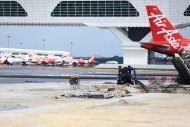 SEPANG, Nov 27 — Malaysia Airport Holdings Berhad (MAHB) questioned today the need to open its books and operations at the second Kuala Lumpur International Airport (klia2) to government auditors.
SEPANG, Nov 27 — Malaysia Airport Holdings Berhad (MAHB) questioned today the need to open its books and operations at the second Kuala Lumpur International Airport (klia2) to government auditors.
The government-linked company’s managing director Datuk Badlisham Ghazali said that as a public-listed company, it was already subjected to “higher scrutiny” from other regulators.
“With regards to the Auditor-General, when I was working for the government, I had always welcomed the A-G.
“My question is what type of audit will it be because we get audited and reviewed so many times, we just don’t want it to overlap,” he told reporters before a media tour of klia2 here.
Yesterday, Parliament’s Public Accounts Committee (PAC) chairman Datuk Nur Jazlan Mohamed said the Auditor General should audit MAHB’s performance on building KLIA2.
He said the committee found that MAHB, whose major shareholder is sovereign wealth fund Khazanah Nasional Berhad, did not prioritise the need of its “customers”, including the leading budget airline AirAsia.
In response to criticism from the parliamentary committee, Badlisham said MAHB will try to get a copy of PAC’s report through the Transport Ministry and consult its board of directors first for any action to be taken, stressing that any decision was “not up to the CEO or MD to say yes or no”.
The PAC had chastised MAHB for dictating to its customers what they should use instead of building an airport that suits the users requirement.
The airport was originally scheduled for completion in 2011, but was delayed several times until it was finally operational in May this year.
The costs also ballooned from the original RM1.7 billion to RM4 billion because of the changes to the design made during the construction, to which Badlisham today said was because of input from various stakeholders that “didn’t come all at once”.
He also defended the cost and the project delay saying the cost was one of the lowest among similar airports globally and was built at record time for an airport of this size.
The PAC’s report however noted that the rise in cost also stemmed from MAHB’s decision to build a hybrid airport instead of a budget terminal as requested by its biggest client, AirAsia.











